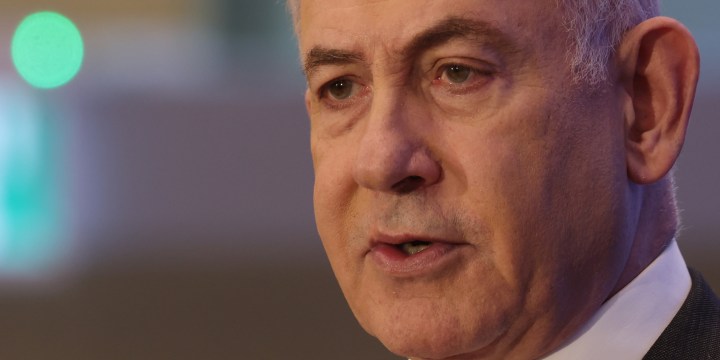MIDDLE EAST CRISIS UPDATE: 26 FEBRUARY 2024
Netanyahu to reveal Rafah civilian action plan; Israel denies visas, permits to Gaza aid workers

Israeli Prime Minister Benjamin Netanyahu said he would have a ‘plan for action’ in hand on Sunday for moving the civilian population out of Rafah in the southern part of the Gaza Strip ahead of an offensive to ‘dismantle’ remaining Hamas battalions.
Israel has stopped renewing visas and work permits for scores of aid workers who provide vital support for Palestinians in the West Bank and Gaza in the wake of the 7 October attacks.
The US and its allies struck multiple targets in Houthi-controlled areas of Yemen on Saturday, responding to increased attacks on commercial shipping in the Red Sea by the Iran-backed militant group.
Netanyahu says he’ll soon have plan for Rafah civilians
Israeli Prime Minister Benjamin Netanyahu said he would have a “plan for action” in hand on Sunday for moving the civilian population out of Rafah in the southern part of the Gaza Strip ahead of an offensive to “dismantle” remaining Hamas battalions.
“There is no disagreement with me and the US about the need to evacuate the population,” Netanyahu said in an interview with CBS’s Face the Nation.
Israel did not need “prodding” by the US to shield Gaza civilians, he added. The plan would include how to “dismantle” remaining Hamas battalions, Netanyahu said.
The Israeli leader said people now in Rafah, near the Egyptian border, would be directed north. “There’s room for them to go north of Rafah to the place that we’ve already finished fighting in,” Netanyahu said.
Much of Gaza has been devastated by Israeli air and ground bombardments since October, and most of the million or more civilians now sheltering in Rafah were moved from areas in the north.
Separately, Netanyahu said he couldn’t predict a timeline for a deal with Hamas on swapping Israeli hostages held in Gaza for Palestinian prisoners in Israel.
Israeli media reported that talks on Friday involving the Israeli delegation and representatives from the US, Egypt and Qatar had yielded a breakthrough.
Netanyahu told CBS that Hamas, which is considered a terrorist organisation by the US and European Union, first needed to back off “delusional claims” which he didn’t specify.
An intense Israeli military operation in Rafah could take “a matter of weeks”, and Israel would proceed with it whether or not there was a hostage/temporary ceasefire deal, Netanyahu said.
Separately, on CNN’s State of the Union, US National Security Advisor Jake Sullivan said the Biden administration had made it clear that all parties need to make every effort towards a temporary ceasefire.
“We are telling everyone, including the Israeli government, that it is our firm position that every effort be exercised to get to this agreement, and then we can move forward from there,” Sullivan said.
Israel has been attacking Hamas in Gaza for nearly five months, killing almost 30,000 there, according to the enclave’s Hamas-run health ministry. Meantime, conditions on the ground in Gaza are increasingly desperate.
Eighteen of 24 Hamas battalions have been destroyed since Israel’s campaign started after the 7 October attacks on southern Israel by Hamas operatives, in which 1,200 people were killed and 250 kidnapped.
Israel denies visas to aid groups working with Palestinians
Israel has stopped renewing visas and work permits for scores of aid workers who provide vital support for Palestinians in the West Bank and Gaza in the wake of the 7 October attacks.
Faris Arouri, director of the Association of International Development Agencies (Aida), an umbrella group, said those barred include country directors and emergency response teams, as well as senior management and other expatriates working in the West Bank or coordinating matters inside Gaza.
Aida’s members include Oxfam, Action Against Hunger, Amnesty International, Care International and Catholic Relief Services.
Until now, Israel’s Welfare Ministry has played a key role in recommendations for such visas. But it doesn’t feel equipped to do the requisite background checks and urged the Prime Minister’s Office to designate a different agency, according to Gil Horev, a ministry spokesperson.
The Prime Minister’s office said it had asked the National Security Council to figure out the best way to proceed, which may take some time.
“It’s creating a huge bottleneck for organisations,” Arouri said. “More than 60% of expatriate humanitarian workers have had their visas expire in the past few weeks because, as of 7 October, the Israeli authorities stopped issuing work visas.”
Gerald Steinberg, a retired Israeli political scientist who founded NGOMonitor, a group that seeks to expose nonprofits that work against Israel, said that some of the organisations in question are anti-Israel, and that the time has come not to automatically renew their presence.
“October 7 changed the rules and Israel is not just going to give out those visas,” he said. “Many of these groups have been propagandists of Palestinian victimhood and Israeli aggression.”
Three aid workers for major international organisations said their work permits had not been renewed recently. As a result, they’ve had to choose whether to leave Israel or stay in the country without working.
US, allies step up strikes on Houthi targets after attack surge
The US and its allies struck multiple targets in Houthi-controlled areas of Yemen on Saturday, responding to increased attacks on commercial shipping in the Red Sea by the Iran-backed militant group.
The strikes on 18 Houthi sites at eight locations were the broadest announced since 3 February, providing new evidence that the Yemen-based militants are engaging the US and its allies in an extended battle. Targets included underground weapons storage sites, missile storage facilities, air defences and one-way attack unmanned aerial systems, according to a Pentagon statement.
“The United States will not hesitate to take action, as needed, to defend lives and the free flow of commerce in one of the world’s most critical waterways,” US Defense Secretary Lloyd Austin said.
Despite repeated strikes by the US, the UK and their partners since mid-January, the Houthis have continued attacking naval and commercial vessels in the Red Sea, ostensibly as a means of pressuring Israel to end its war in Gaza against Hamas. The assaults have helped boost oil prices, with Brent pushing toward $84 a barrel last week, and upended trade through the southern Red Sea.
Read more: Iran-backed Houthis prepare for long Red Sea battle with US
Sana’a, Yemen’s capital, was among the places targeted on Saturday, with residents reporting large explosions.
Supporting the strikes on Saturday were Australia, Bahrain, Canada, Denmark, the Netherlands and New Zealand.
Gaza ceasefire talks ‘yield breakthrough’
Israeli media reported that talks in Paris on Friday about a ceasefire in Gaza involving the Israeli delegation and representatives from the US, Egypt and Qatar had yielded a breakthrough.
The talks “were very good and saw real progress”, Haaretz reported, citing people it didn’t identify. The status of the talks couldn’t be independently verified.
Based on the progress seen, the parties would soon be able to present Hamas with an updated framework for a deal to exchange Israeli hostages held in Gaza with Palestinian prisoners in Israel in the near future, according to the report.
A foreign diplomat who wasn’t identified told Haaretz that “all sides are showing flexibility, and a deal could be reached even before Ramadan”, which starts on the evening of 10 March.
Separately, the Saudi Asharq network reported that Hamas had softened some of its key demands around a possible hostage release deal. Hamas appeared ready to accept an initial truce of six weeks instead of a permanent ceasefire, according to the network, which was cited by The Times of Israel.
Read more: Palestinian economy devastated by war, says World Bank
Axios on Saturday reported a proposal that Hamas release roughly 40 hostages in exchange for a six-week ceasefire and the freeing of “hundreds” of Palestinian prisoners in Israel. DM




















 Become an Insider
Become an Insider
Goodbye to international law as we knew and respected it back to survival of the first to kill.
Racism on steroids by Israel reveals where the loyalty of fake civilized Europe lies.
They are doing to Palestinians exactly what was done to them
The phrase “release hostages in exchange for the release of prisoners” implies that the prisoners are tried and convicted criminals. The reality is that the large majority of these prisoners are actually detainees who are being held without trial.
Israel is the only country in the world with support from no.1 superpower in the the world allowed to ignore international law and supplied with the means to do so.
A very helpful antidote for countries who believed in the so called European civilization and democracy models.
We should have focused on who we are.
We have a lot of brilliant minds who couldn’t master English who failed school because subject are taught in the British language which was deemed the international language whilst most innovations are produced by countries who use their own language as a learning medium for all subjects, give a bells to the Afrikaners on that one, even when there was an outcry on an Afrikaans university they stood their ground against the colonial language of slavery.
We are waking up thanks to the Ukraine and Palestine wars our relationship with America is being reviewed for practicing what Europe taught us is the correct international law to abide with.
Only this time it doesn’t suit their intents and interests.
Israel didn’t see the October attacks coming. Despite their much talked about intelligence systems and capability. IDF troops shot down “civilians” who later turned out to be escaped Israeli prisoners. Israel are talking about numbers of Hamas operatives killed, remaining and so on, but they clearly don’t know who is who or what is going on. They can only react to what does happen.
So how on earth do they propose to let only civilians out of the Rafah area? How will they reliably separate civilians from Hamas irregulars?